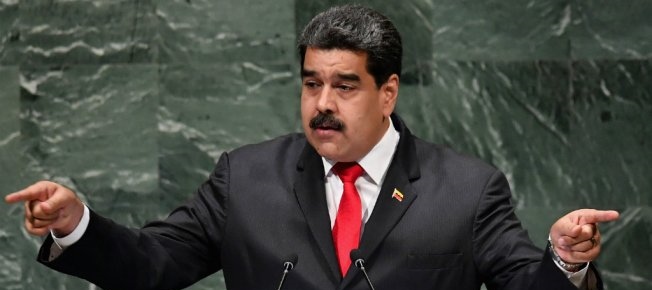Maduro visits New York despite White House rebuff
September 29, 2018 | Expert Insights

The Venezuelan President had earlier claimed that he would be killed if he ever visited New York and his visit to the UNGA has kept everyone at the UN guessing.
Background
The Republic of Venezuela is located in northwest South America. The country stretches across over 900,000 square kilometres. It is bordered by the Caribbean Sea in the north, and Columbia, Guyana, and Brazil in the west, east, and south, respectively. Venezuela was colonised by Spain in 1522 and became the first Spanish territory to declare independence from the empire in 1811. Venezuela suffered political turmoil and autocracy, remaining dominated by regional military rule until the mid-20th century.
In the early 20th century, Venezuela discovered oil and has since become the world's largest known oil reserve and one of the leading exporters of oil. However, despite this, many Venezuelans live in abject poverty.
Nicolas Maduro took office in 2013. Under his rule, there has been a rise in inflation and a shortage of basic goods. A drop in oil prices has added to the administration’s problems. The nation’s economy has become increasingly unstable and there if hyperinflation in the region. Inflation is projected to rise to 13,000%. As of 2017, the country had only $10 billion in reserves and a debt of $120 billion. The country is undergoing a refugee crisis with thousands of citizens fleeing conditions of rapidly declining economic, health, and safety conditions. Read more on Venezuela’s refugee crisis here.
Due to the current regime’s lack of regard for democratic process, the country has multiple sanctions imposed on it by the EU and United States. Earlier this year, Venezuelan President Maduro launched a cryptocurrency “Crypto” to circumvent sanctions imposed by the US government.
Analysis
President Maduro seemed totally unconcerned about the calls on Wednesday from six countries — Argentina, Canada, Chile, Colombia, Paraguay and Peru — for the International Criminal Court to probe him for crimes against humanity. He tweeted a photo of himself aboard the plane, saying he intended to “bring the truth” about Venezuela to the United Nations. He made a point of saying he was accompanied by his wife, Cilia Flores, who was sanctioned Tuesday by the U.S. Treasury, which also seized a plane belonging to a Maduro ally.
Maduro met with two men who symbolize adversarial relations with the United States — Iranian President Hassan Rouhani and Russian Foreign Minister Sergei Lavrov. Like Venezuela, both countries have had sanctions imposed on them.
Lavrov told Maduro, “We are ready to offer all-around assistance for all of your plans.”
From the podium in the U.N. General Assembly where Trump had bashed him a day earlier, Maduro did not soften his tone or his message.
Accusing the United States of treating the world as its own property, he complained of “economic persecution” from U.S. sanctions, which prevent using U.S. dollars for international trade like oil sales. He cited Venezuela’s oil and gold reserves as the reason “oligarchies of the continent dominated by Washington are looking to dominate political power in Venezuela.”
Maduro arrived at a highly sensitive time, when talk of military intervention in the fast-collapsing country is escalating.
Counterpoint
Despite Maduro’s claims of a U.S. plot against his nation, he has long expressed an eagerness to meet with Trump, particularly after he saw Trump go from calling North Korea’s Kim Jong Un “Rocket Man” at last year’s General Assembly session to praising him at this year’s. Analysts suggested that unless Maduro was prepared to pledge significant change in course, a meeting with Trump could do more harm than good.
Assessment
Our assessment is that Venezuela is in the midst of an economic and humanitarian crisis that is unlikely to be resolved due to the outcome of these elections. Maduro, in the past, has ignored his critics and has worked towards accumulating more power. This comes during a period when the citizens of the nation do not have access to basic resources like food, water, and medicine. We believe that Maduro came to New York in hopes of meeting with President Trump but under the cover of the UN General Assembly.








Comments